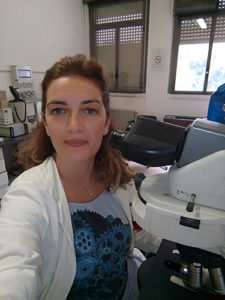Bio
Paola M Maroni received her degree in Biological Sciences and the PhD in Experimental Pathology at the University of Milan, Italy. During her PhD career, she spent two years at the Institut für Biochemie und Molekularbiologie, Bern, Switzerland, under the supervision of Prof. Angelo Azzi, were she improved her expertise in the study of the signal transduction mechanisms in different pathological diseases. She achieved: research fellow from Fondazione Anna Villa Rusconi, post‐Doctoral research fellow and Research Contract (Assegno di Ricerca) from the University of Milan.
Recently, the main field of interest concerns the molecular mechanisms of neoplastic and metastatic growth and in particular the interaction between human breast cancer cells and bone microenvironment; the epithelial‐mesenchymal transition process in breast cancer cells with bone tropism; and the role of epigenetic mechanisms in the invasive behaviour.
She published more than 50 papers in International peer‐reviewed journals which has allowed her to reach actual score of H‐index of 20. She is member of the Italian Society of Pathology and Translational Medicine (SiPMeT) and is currently part of the Editorial Board of IUBMB Life. She served as reviewer for several high impact international journals.
Publications
Maroni P, Puglisi R, Mattia G, Carè A, Matteucci E, Bendinelli P, Desiderio MA. miR34a absence in bone metastasis, and miR34a inactive towards Met in non‐metastatic breast carcinoma correlate with Met expression during tumor progression. Carcinogenesis. 2017 38: 492–503. doi: 10.1093/carcin/bgx027 IF: 4.874
Maroni P, Bendinelli P, Resnati M, Matteucci E, Milan E, Desiderio MA. The Autophagic Process Occurs in Human Bone Metastasis and Implicates Molecular Mechanisms Differently Affected by Rab5a in the Early and Late Stages. Int J Mol Sci. 2016 17: pii: E443. doi: 10.3390/ijms17040443. IF: 3.257
Maroni P, Bendinelli P, Morelli D, Drago L, Luzzati A, Perrucchini G, Bonini C, Matteucci E, Desiderio MA. High SPARC Expression Starting from Dysplasia, Associated with Breast Carcinoma, Is Predictive for Bone Metastasis without Enhancement of Plasma Levels. Int J Mol Sci. 2015 16: 20108‐28122. doi: 10.3390/ijms161225997 IF: 3.257
Bendinelli P *, Maroni P *, Matteucci E, Desiderio MA. HGF and TGFβ1 differently influenced Wwox regulatory function on Twist program for mesenchymal‐epithelial transition in bone metastatic versus parental breast carcinoma cells. Mol Cancer. 2015 14: 112‐128. doi: 10.1186/s12943‐015‐0389‐y. IF: 5.888 *equally contributing authors
Maroni P, Matteucci E, Drago L, Banfi G, Bendinelli P, Desiderio MA. Hypoxia induced E‐cadherin involving regulators of Hippo pathway due to HIF‐1α stabilization/nuclear translocation in bone metastasis from breast carcinoma. Exp Cell Res. 2015 330: 287‐299. doi: 10.1016/j.yexcr.2014.10.004. IF: 3.378
Maroni P, Bendinelli P, Matteucci E, Locatelli A, Nakamura T, Scita G, Desiderio MA. Osteolytic bone metastasis is hampered by impinging on the interplay among autophagy, anoikis and ossification. Cell Death and Dis. 2014 5:e1005. doi: 10.1038/cddis.2013.465. IF: 5.014
Maroni P, Matteucci E, Luzzati A, Perrucchini G, Bendinelli P, Desiderio MA. Nuclear co‐localization and functional interaction of COX‐2 and HIF‐1α characterize bone metastasis of human breast carcinoma. Breast Cancer Res Treat. 2011 129: 433‐450. doi: 10.1007/s10549‐010‐1240‐1. IF: 4.431
Previdi S *, Maroni P *, Matteucci E, Broggini M, Bendinelli P, Desiderio MA. Interaction between human‐breast cancer metastasis and bone microenvironment through activated hepatocyte growth factor/Met and β‐catenin/Wnt pathways. Eur J Cancer. 2010 46:1679‐1691. doi: 10.1016/j.ejca.2010.02.036. IF: 4.944
*equally contributing authors
Maroni P, Bendinelli P, Matteucci E, Desiderio MA. HGF induces CXCR4 and CXCL12‐mediated tumor invasion through Ets1 and NF‐kB. Carcinogenesis 2007 28: 267‐279. PMID:16840440 IF: 5.406

